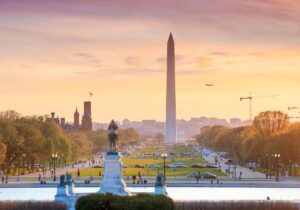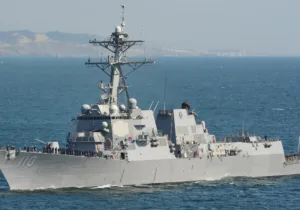His birthname was Marie-Joseph Paul Yves Roch Gilbert du Motier—but “it’s not my fault,” he joked. He was born in 1757 in Chavaniac in the province of Auvergne (now Haute-Loire), to a family of immense wealth and of distinction unmatched in the region and perhaps, as sometimes suggested, the whole of France. Of martial stock, his paternal uncle died fighting the Austrians in 1734 in Milan, and in 1759 his own father was smote down by a cannonball in a fight against a British-led coalition in Westphalia. Following the death of his father he became, at age two, the marquis and Lord of Chavaniac. At age 14 he was commissioned an officer in the Musketeers, before being transferred to the dragoons, or French cavalry. Shortly thereafter, in a training exercise in Metz, he had a dinner with the Marquis de Ruffec, the Army of the East’s commander. The two men discussed the ongoing rebellion by colonists in North America against British rule. The descriptions of men fighting for their liberty fired his imagination and, in that moment, he declared “my heart was dedicated.” Though opposed by his powerful family, he determined to join the American cause. When he learned the continental army could not afford to pay for his transAtlantic voyage, he bought a ship, the Victoire, with his own funds and made the two-month crossing. He landed near Georgetown, South Carolina the 13th of June, 1777. By the end of his life, Marie-Joseph Paul Yves Roch Gilbert du Motier would be known as one of this country’s greatest patriots. He would also be known, more simply, as Lafayette.
Joining the American quest for liberty, Lafayette volunteered to serve without pay and was commissioned a major general by the continental congress. He soon met General George Washington and the two men bonded at once. Over the course of the revolution Lafayette would lead and fight alongside American troops, be wounded at Brandywine, suffer alongside the men at Valley Forge, be cited for “gallantry, skill, and prudence”, help achieve the surrender of Cornwallis at Yorktown, and, finally, celebrate the American victory. He would be made an honorary American citizen and would return to France to great acclaim. Beyond George Washington, Lafayette was friend to many of the American greats—John and Abigail Adams, Ben Franklin, Thomas Jefferson, and John Jay among them—and he would continue to work on behalf of the French and American alliance. In France, he would serve his home nation with great distinction, would be a key abolitionist, and would fight for the religious liberty of Protestants. He would return to the United States a pair of times, always to warm welcome.
When he died, both houses of congress were draped in black bunting for 30 days and members wore tokens of mourning. John Quincy Adams gave a eulogy that lasted three hours. At rest at last, Lafayette was buried next to his wife, in Paris, under soil that he had brought from Bunker Hill, which his son, George Washington Lafayette, sprinkled over his grave. He was a true hero of two worlds.
There is much to be said of Lafayette. But it is on his “disinterestedness” that I want to linger. In his marathon eulogy, Adams called him “high on the list of the pure and disinterested benefactors of mankind.” Indeed, Lafayette’s image in America is, in part, grounded in his willingness to fund his own way to a war he would fight without pay for the freedom of a country not his own. Samuel Adams was counted among those struck that one would abandon the ease of the French court to embrace “the hardships of battle” for a cause about which he needn’t have concerned himself.
I have said before that, to a degree, self-interest is a primary purpose of government—as expressed in the duty to provide and maintain the common good of the people over whom it governs. As such, it is a corresponding duty of a sovereign government to acquire the capacity—the power—to meet its responsibilities. But, as Lafayette would seem to have agreed, I have also argued that duty doesn’t necessarily end at one’s borders. When one has the genuine capacity to restrain evil, protect the innocent, or remedy injustice by coming to the aid of a besieged neighbor one, most often, must. The Christian tradition has furnished frameworks to help evaluate when, in fact, one does have both cause and capacity.
One needn’t be a world-government advocating globalist to suggest this. It is as an American nationalist that I believe America has cause to intervene on behalf of assaulted neighbors in pursuit of justice. It is in our own best interests to be moral—if for no other reason than to make American power sufferable to those under it. Commitment to the belief that “all men are equated equal” comes with certain far-reaching–and sometimes seemingly disinterested–responsibilities.
Lafayette’s spirit has often been invoked in more than one direction across the Atlantic. His name and image were often brought to bear on arguments for American entry into World War I. Such an appropriation had its effect and some American soldiers deployed to France are said to have declared, upon landing, “Lafayette, we are here!”
—
Marc LiVecche is managing editor at Providence
Image: George Washington and Lafayette at Valley Forge, John Ward Dunsmore, 1907. Source: http://www.loc.gov/pictures/item/91792202/







 Sponsor a student for Christianity & National Security 2024
Sponsor a student for Christianity & National Security 2024